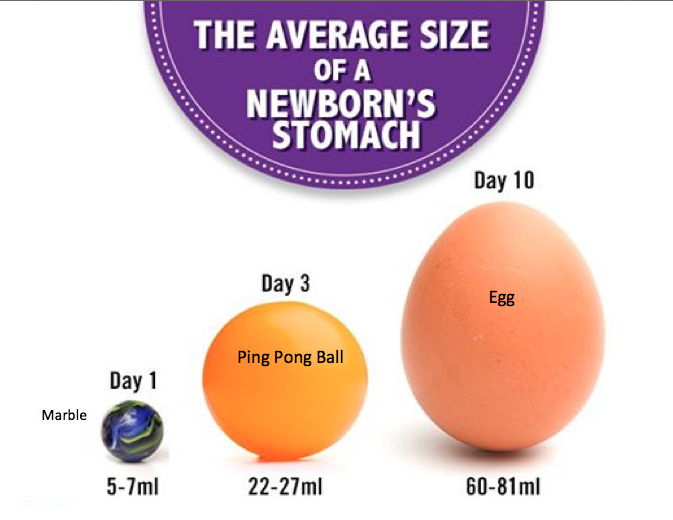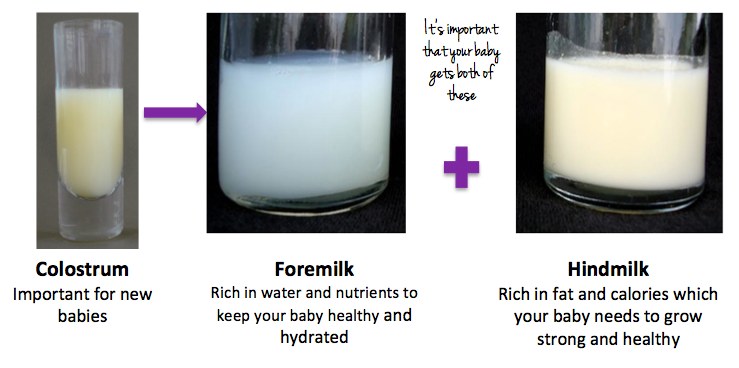Last Updated on 9 years by Publishing Team
Breastfeeding provides your baby with all the nutrients they need for the first six months of life and also lays a healthy foundation for a healthy life. Breast milk is easy for your baby to absorb and is the perfect food to help them grow and develop.
Babies need no other food except breast milk for the first six months of their life (this means NO water, bu, juice, or foods) and continue to get benefits from having breast milk (along with complimentary foods) for up to 2 years.
Why is it important to start breastfeeding early?
Your body knows just what to do when it comes to pregnancy and it actually starts producing breast milk for your baby before it’s born. Knowing that your baby has different nutrition needs immediately after birth, your body produces colostrum – a yellow, nutrient rich form of breast milk. It’s more nutrient rich than normal breast milk because your baby’s stomach is so small they can’t drink big volumes. Colostrum is the perfect first food for your baby and the reason why breastfeeding should start within one hour of birth. Your baby will need those nutrients after a stressful day!
After 2-3 weeks, your milk will become thinner and less yellow – this is called ‘foremilk’. During a feeding, your milk will then change to ‘hindmilk’, which is thicker and milkier. Both are important for you baby for different reasons, which is why it’s essential to let your baby drain one breast before changing to the other.
What are the benefits of breastfeeding?
For your baby, the benefits of breastfeeding include protection from:
- Childhood diabetes
- Ear and chest infections
- Gastro-intestinal (tummy) infections
- Urine Infections
- Chest Infections
- Eczema (skin diseases)
For the mother, breastfeeding can protect her from:
- Obesity
- Asthma
- Ovarian cancer
- Breast cancer
- Pregnancy related weight gain. Did you know breastfeeding can burn up to 500 calories a day? That’s the same as going for an hour and a half walk!
As well as that, breastfeeding strengthens the mother and baby bond both physically and emotionally.
How do I know when my baby is hungry?
Babies show several signs in readiness for breastfeeding. Tuning into your baby’s signs will make your feeding more successful and satisfying for both you and your baby. Your baby does not have to cry to let you know he is hungry; crying is the last hunger sign!
Hunger signs include;
- Awakening soft sounds;
- Mouthing (licking lips, sticking tongue out, licking lips);
- Rooting towards the breast (turning the head and opening the mouth);
- Hand to mouth activity;
- Beginning to cry softly and gradually crying louder.
Try to learn your babies feeding signs early in the cycle – avoid crying – and begin breastfeeding!
Can I give my baby any other food or drink?
TRY NOT TO GIVE YOUR BABY OTHER FOOD OR DRINK FOR THE FIRST 6 MONTHS!
The more you breastfeed your baby, the more milk you will produce. Giving other food or drink will reduce your milk supply. You might also increase the chances of your baby getting ill if you give them other food and drink.
Breast milk contains all the nutrients your baby needs, if your baby is full from other foods they will drink less breast milk and may not get all the important nutrients they need each day for healthy growth and development.
How do I know if I’m doing it right?
Breastfeeding is a very new and unique experience for first time mothers and it’s hard to tell if you’re doing it correctly and your baby is getting enough milk.
Here are some signs of successful breastfeeding:
- Your baby will appear content and satisfied after most feeds.
- Your baby should be healthy and gaining weight after the first two weeks.
- Your breasts and nipples should not be sore.
- After the first few days, your baby should have at least six wet nappies a day.
- From day 4, your baby should also pass at least two yellow stools every day, for the first few weeks.
Signs of effective suckling include:
- Slow, deep sucks and swallowing sounds
- Cheeks full and not drawn in
- Baby feeds calmly
- Baby finishes feed by him/herself and seems satisfied
- Mother feels no pain
How can I express milk if I need to be away from my baby for work or other commitments?
There’s 5 steps to expressing breast milk:
- Place thumb and finger opposite to each other on nipple
- Press inward and release several times
- Rotate thumb and finger to press the nipple
- Do not slide or lift fingers
- Express 6-8 times in 24 hours – at night as well.
Storing milk
Remember to use a clean cup with lid to put the milk in so it is protected from contamination. You can keep it for 6-8 hours in a cool place at home.
If you have a fridge:
- You can store milk in the fridge for up to 5 days at 4°c or lower (usually at the back of the fridge).
- Breast milk can be stored for two weeks in the ice compartment of a fridge or for up to six months in a freezer.
To thaw:
- Defrost frozen breast milk in the fridge and once thawed use it straight away.
- Run container of milk under cool water until it liquefies.
- Place the container in a bowl of warm water.
- Do not boil or reheat your milk. Heat will destroy the anti-infective products.
- Do not heat in microwave either.
What if I have cracked/ sore nipples or blocked breasts?
Cracked/sore nipples: This is normally due to poor attachment. Try nursing on the less painful side first and help your baby attach properly. Alternatively you could also try expressing breast milk.
Blocked/hard, sore breast: This is normally due to poor suckling. To prevent this start breastfeeding early and give your baby frequent feeds. Also gently massage your breasts and apply warm water/cloth before feeds.
If you are having trouble breastfeeding, you should visit your nearest maternal child health clinic as early as possible and get advice and instructions on how to breastfeed correctly.
What if I can’t breastfeed?
For many reasons some women are unable to breastfeed. For these women, infant formula has been created as a breast milk alternative. It contains special vitamins and minerals so that it can provide your baby with everything they need for the first 6 months of life.
It’s important to note that infant formula and cows milk are very different and cows milk cannot be fed to babies under 1 year of age. It’s also important to make up infant formula according to the packet instructions and never dilute the formula because this will mean your baby isn’t getting enough nutrients for healthy growth. Consult with your Maternal Child Health Nurse or Dietitian for advice on choosing an infant formula.

